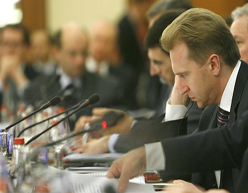Banks use legal loopholes to keep government’s trillions in their vaults

As it has finally turned out, the trillions of rubles disbursed by the Russian government in form of emergency financial aid package to boost bank liquidity and salvage companies and industries from the devastating negative impacts of global financial crunch that had already bankrupted corporations in other countries, have got locked up in the commercial banks. And it seems, they will be in the banks’ vaults for a long time.
Speaking at the State Council meeting in Izhevsk in mid-November, Russian President Dmitry Medvedev noted that the government had adopted a plan of actions to combat the global crisis that would protect the financial, banking sectors, all the key industries and the SMEs, adding the he does not exclude the possibility of the government being forced into injecting over 5trln.rubs to meet its objectives in the battle against the negative impacts of the international financial crunch. However, it is a significant part of this bailout financial package that is being hoarded by the commercial banks on purely technical grounds, instead of passing it down to their intended recepients.
What is also equally worrying is the fact the banks are not in hurry to forward these huge financial resources to the needy companies, as intended by the Kremlin and government. However, the banks are also entirely not to blame for these problems, because, the government, in its hurry to disburse the emergency bailout funds, forgot to change the banks’ lending rules that will have enabled financial institutions to grant loans to cash-starved businesses, an omission that created the so-called ‘thrombosis,’ the official term for the breakdown in the cash flows in the nation’s financial system. Experts said they had expected such situation with government funds, because both the bankers and bureaucrats surely knew beforehand that these resources will eventually end in banks’ vaults with little or no opportunity of moving further to their addressees.
This became clear on December 1, when First Deputy Prime Minister Igor Shuvalov, briefing the Russian president on the realization of the government’s financial support measures for businesses, conceded that the government has so failed to failed to completely cure the ‘thrombosis’ in the Russian banking system. “All the necessary decisions and measures on the state support for businesses have been taken, but the disbursed cash has yet to reach their intended addressees,” he said. “The situation is very complicated, because we have so far not been able to dislodge the all the ‘thrombi’ in the banking system due to the fact that the normative acts regulating banking operations require financial institutions to demand liquid collaterals as one of the major conditions for granting loans to clients” he added. With these normative acts intact, and the fact that most companies assets devaluated, banks are completely at seas on how to use these state’s financial resources to grant loans to financially starved corporations in the country. “The banks currently do not know or understand how full their obligations,” Shuvalov added. As a way of the dilemma, the first deputy prime minister proposed amending the way the Central Bank will henceforth execute its regulatory functions. “This can be done by introduction the relevant amendments to the banking legislation, for instance, by significantly relaxing the requirements for securing loans,” he added.
Such proposals seemed to augur well with the Russian president, as he gave his green light for the measures. “If the market capitalization values of huge companies have fallen several times, and we all the real worth of these companies, especially those in the raw-commodities sectors, then totally different sets of loan requirements should be laid down for such corporations,” he said. The head of state specifically noted that this problem with the thrombosis in the nation’s banking system requires urgent solution, because an unnecessary delay or inaction means that some companies might not last long enough during this crisis for the government’s help to reach them. “This is a serious task. We need to look for ways out, think over the slotions and offer me some proposals,” he added. “But if this will be done in two-four months’ time, then we might lose some companies.”












 Web design,
Web design,